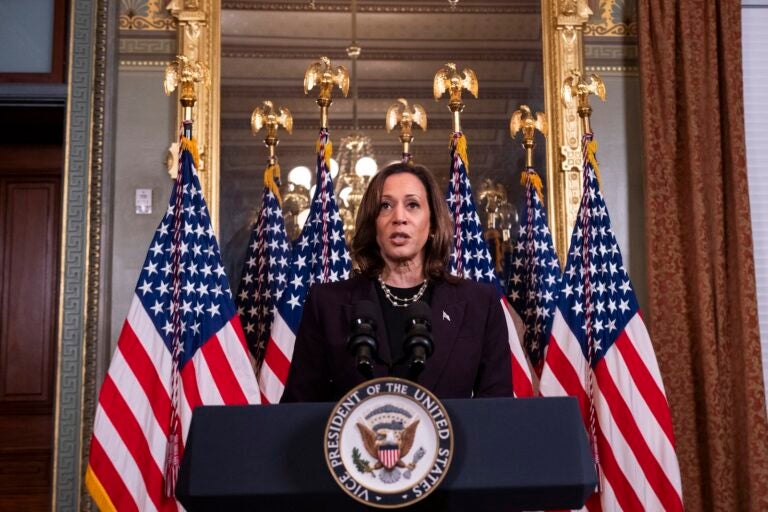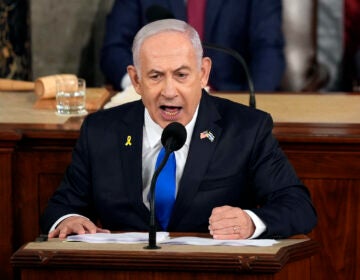Harris says she ‘will not be silent’ about humanitarian toll in Gaza
In her remarks, which came after a meeting with Israeli Prime Minister Benjamin Netanyahu, Harris also said she held an “unwavering commitment to Israel."

U.S. Vice President Kamala Harris speaks to the press following a meeting with Israeli Prime Minister Benjamin Netanyahu in the Vice President’s ceremonial office at the Eisenhower Executive Office Building in Washington, DC, on July 25, 2024. (Photo by ROBERTO SCHMIDT / AFP)
Vice President Kamala Harris, in remarks Thursday after meeting with Israeli Prime Minister Benjamin Netanyahu, said that while she held an “unwavering commitment to Israel,” she “will not be silent” about the humanitarian toll in Gaza.
“I’ve said it many times, but it bears repeating: Israel has a right to defend itself and how it does so matters,” Harris said. But, she said, she discussed with Netanyahu her “serious concern about the scale of human suffering in Gaza, including the death of far too many innocent civilians.”
In her remarks, Harris reiterated the deal proposed by Biden that would ultimately lead to a permanent end to the fighting, the release of all Israeli hostages by Hamas, and a complete Israeli military withdrawal from Gaza. Earlier Thursday, John Kirby, the NSC spokesman, said “gaps … remain” in the negotiations but “we believe that they are of a nature that they can be closed.”
Harris said she told Netanyahu “it is time to get this deal done.”
Netanyahu met earlier in the day with President Biden at the White House. His visit comes at a critical moment in American politics: with four months to the election, the White House is eager to secure a cease-fire deal to end Israel’s war with Hamas, which began last October with the militant group’s attack on Israel that killed 1,200 people.
Israel’s response has killed 39,000 Palestinians, a significant proportion of them civilians, according to the Ministry of Health in Gaza.
Harris, who is now the likely Democratic presidential nominee, inherits this war as she attempts to maintain a delicate balancing act in a race where one misplaced word on the conflict can cost her support in key states that Democrats need to keep the White House.
“Let us all condemn terrorism and violence. Let us all do what we can to prevent the suffering of innocent civilians,” Harris said Thursday. “And let us condemn anti-Semitism, Islamophobia and hate of any kind.”
She is maintaining the administration’s support of Israel and trying to not alienate supporters of the Jewish state, who make up a key Democratic constituency. But she is also expressing sympathy for Palestinian civilians killed in the conflict and trying to win back some of the young, progressive, Black and Brown voters whom Biden alienated with his response to the war.
“What has happened in Gaza over the past nine months is devastating,” she said Thursday. “The images of dead children and desperate hungry people fleeing for safety, sometimes displaced for the second, third or fourth time. We cannot look away in the face of these tragedies. We cannot allow ourselves to become numb to the suffering and I will not be silent.”
Harris and the humanitarian cost of the conflict
As Biden’s vice president, Harris has remained in lockstep with the president on policy, including his steadfast commitment to the security of Israel.
But there have been other times where the vice president has differed in tone, particularly in describing what she has called the “humanitarian catastrophe” in Gaza.
In both public and private, Harris is seen to show a greater understanding and empathy for Palestinians, multiple people told NPR. And they say she’s also shown greater empathy for protesters demonstrating against Israel’s military operation.
“If you look at her public remarks about Gaza as vice president, unlike Biden, she really did manage to convey a much greater empathy and sympathy for the suffering of Palestinians,” said Aaron David Miller, a longtime Middle East expert with the Carnegie Endowment for International Peace.
A political opportunity for Harris
For some Democrats who voted ‘uncommitted’ during the presidential primaries as a way to protest Biden’s policy, Harris’ expressions of empathy has left them open to giving her a chance.
“If I had, for example, tried to go to a mosque or Arab community event and urged them to vote for Joe Biden, I would never be invited back. The anger was so deep. And the hurt was so deep — even for me,” said Georgia State Rep. Ruwa Romman, a Palestinian-American.
But Romman says she thinks people would be open to hearing from Harris and letting her make her case.
While some Democrats would like to see Harris chart a new policy path, experts say it’s highly unlikely that if she became president, Harris would break from decades of bipartisan consensus on Israel.
Still, experts say she may be more open to strike a tone distinct from Biden’s. “She’s a strongly, I would argue, pro-Israeli, moderate, mainstream Democrat,” said Miller.
“But at the same time, she really doesn’t have Biden’s long history with Israel nor any of its leaders. And she’s also from a different generation, which means she’s going to put a greater focus, I think, on human rights, diversity, discrimination.”
Abdullah Hammoud, the mayor of Dearborn, Mich., home to the largest Arab-American community in the U.S., voted uncommitted during the primaries.
He has said he felt betrayed by the administration, but now says he feels like there’s an opportunity for Harris to “course correct.” He points out that a majority of Democrats disapproveof the Israeli military’s actions in Gaza.
“Now, whether hope flourishes or dies, I really believe it’s going to be dependent upon these next crucial weeks and the messages that come forward from Vice President Kamala Harris’s campaign,” Hammoud said. “I think she has a real opportunity.”
Critics of Biden’s Gaza policy aren’t the only ones watching Harris’ messages in the weeks ahead. Democrats are deeply divided on Israel, and Republicans are united in criticizing her. Netanyahu is scheduled to meet with former President Donald Trump, the Republican nominee, on Friday, and Harris’ views will almost certainly come up.
The vice president typically presides over joint addresses in Congress, but on Wednesday, she was not present for Netanyahu’s remarks. Her team cited a scheduling conflict.
But House speaker Mike Johnson told Jewish Insider it was a “terrible symbolic gesture” and suggested she would “pay a price for it politically.”

Get daily updates from WHYY News!
WHYY is your source for fact-based, in-depth journalism and information. As a nonprofit organization, we rely on financial support from readers like you. Please give today.





